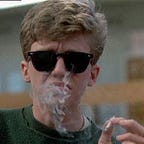Rio Bravo (1959)
Rio Bravo is a classic John Wayne western directed by Howard Hawks, who also directed the first film we analyzed on this blog, Twentieth Century. The film is full of somewhat dated staples of the era, as well as some signature elements of Hawks’s style. A film that comes at the tail end of the heyday for western films, many regard it as one of the last great true westerns, before the genre crossed the threshold of self-awareness.
Our story follows John Wayne as the sheriff of Rio Bravo, Texas, the All-American John T. Chance. His deputy, Dude (Dean Martin) is an alcoholic known for his top-notch shooting skills, that is, when he’s off the drink. The two have locked up troublemaker Joe Burdette (Claude Akins), whose wealthy and powerful brother will soon be on the way to get his kin out of jail. A caravan stops in Rio Bravo with a slick young sharpshooter (Ricky Nelson) and a mysterious and beautiful woman named Feathers (Angie Dickinson). When Joe’s brother Nathan and his gang ride into town, things really hit the fan, so to speak, and it’s an old-timey battle of good versus evil in the most classic sense.
Rio Bravo was at first reminiscent to me of Thunderbolt and Lightfoot, mostly in the way it portrays different masculinities, though largely without the homoerotic subtext. John Wayne’s Chance showcases the pinnacle of the ideal American man, level-headed, competent, pure of heart, a man of the law. He’s contrasted in a sort of mentor role to Dean Martin’s Dude, a man who’s lost control off his addiction after losing the woman he loves, a slave to his urges and his emotions who needs the guiding hand of John Wayne to test him and lift him out of this state. Just look at the still at the top of this article, Wayne above Martin in frame, Dude smiling admiringly at the serious sheriff. The third main kind of masculinity on display here comes Ricky Nelson’s Colorado — a youngster who comes off wise, and skilled beyond his years. He’s a personification of youthful energy, but his hesitation, his unwillingness to get involved are elements that must be molded away by Chance for him to truly mature.
That molding of the young Colorado also speaks to this film’s rejection of westerns like High Noon (1952). Emmanuel Levy explains: “Disturbed by the acclaimed and popular Western “High Noon,” which portrayed Marshall Will Kane (Gary Cooper) so afraid of his adversaries that he spends most of the movie asking town folks for help, only to be rejected by them, Hawks decided to make a movie that will respond more accurately to the dilemma faced by Kane.” Wayne was equally disturbed by High Noon, and his portrayal here tries its best to be Cooper’s antithesis. Especially in how Chance recruits Colorado into his fight — he doesn’t ask him for help, Colorado joins in on his own accord, he mirrors the actions of a man who commands respect.
I think this is the central point of Rio Bravo, especially with its rejection of High Noon. It is a film about a real man, at least in Hawks and Wayne’s view, who commands respects, who is a leader of men. It’s a recognition that films do serve as inspirations, John Wayne’s full acknowledgement of himself as a role model to young boys in America. Rio Bravo paints a heroic, noble portrait of a man, who serves to lift up those around him, and Hawks hopes to lift up those who watch as well.
